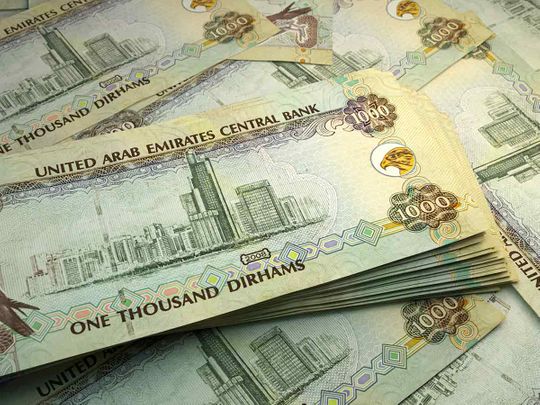
Dubai: The US Federal Reserve has delivered its first interest rate hike of 2023, and as was widely expected, limited the increase to 0.25 per cent – it’s lowest since March 2022. UAE and Gulf businesses – as well as individuals with unfixed loan exposures - will from tomorrow (February 2) feel the additional 0.25 per cent increase.
But what comes next will be of more immediate importance to these businesses and individuals. If the Fed confirms a further easing up on rate hikes, or even a near-term reversal of these, there would be some welcome relief for all those with debts to pay off.
The UAE Central Bank has raised the base rate applicable to its Overnight Deposit Facility (ODF) by 25 basis points, in line with the US move, and changing it from 4.4 per cent to 4.65 per cent. "This decision was taken following the US Federal Reserve Board’s announcement on 1 February 2023 to increase the Interest on Reserve Balances (IORB) by 25 basis points."
The Dollar Index - which measures the US currency's strength or weakness against major currencies - dropped to 101.39, its lowest since May 30 last year.
Bahrain hikes, Qatar stays put
The Bahrain central bank became the first among GCC banks to match the US hike. The revised rates (from 5.25 per cent to 5.5 per cent) in Bahrain will come into effect with immediate effect.
The Saudi central bank also matched the US Fed move, and revised its base rate to 5.25 per cent.
Qatar, in a surprise move, has decided not to join the current round of rate increases, instead sticking with the 5.25 per cent repo rate in place since December.
According to market sources, businesses in the UAE still expect to stick with their spending plans for 2023. “Where businesses have slowed down is on the hiring side of things to manage costs, but not as yet on their expansion or on operational spending,” said a consultant. “Banks are yet to see any changes in their level of lending support for businesses."
The latest US rate hike is the eighth since March last year, among which were multiple hikes of 0.75 per cent each as the Fed combated inflation threats to the economy.
We will need substantially more evidence that inflation is ebbing to be confident that it's moving back toward the target
UAE businesses and their capex
Banking and business sources in the UAE reaffirm that lending activity has not not taken any major dents in recent weeks. Senior banking industry sources say that they are not revising their forecasts on their loan portfolios and the percentage of which could turn bad this year. "Our lending activities remain the same," said one senior banker.
On what UAE businesses should do with their capex plans, “There is no one-size-fits-all answer to whether hiked interest rates will affect capex and cashflow,” said James Mathhew, CEO and Managing Partner at Dubai-based UHY James Chartered Accountant.
“Simply because, new projects can work around the higher interest rate, conduct viability reviews and surge ahead in a way that capex and cashflow is not impacted.
“However, businesses operating with thin margins are likely to face disruptions due to increased costs driven by higher interest rates. The ray of hope businesses can hold on to, in the current economic climate, is that the steep rates are likely to start plunging sometime after the next two to four quarters.
"Until then, repayments on interest and principal for existing loans will cost businesses more, thereby creating a dent in the cashflow."
Gold rises, US markets back in green
Gold prices are starting to see some sharp increases after the fed announcement, from $1,927 an ounce to $1,942 in the hour after the Fed announcement. As for US stocks, it is back in the green for the key indices after starting the day in the negative.
"The markets expected a 25bps rise, which is another step downward for the Fed, which increased rates by 50 basis points in December, following four 75 basis-point hikes in 2022," said Nigel Green of deVere Group.
The US benchmark rate is now in a target range of 4.5-4.75 per cent.
“There’s a sense that things are actually better than the Fed is admitting to, in order to stop over-exuberance of the markets," said Green. “The Fed’s rhetoric doesn’t appear to be changing, despite the data, and the markets are aware of this.”
Plus, there were the recent updates from IMF, which forecast that the global growth could actually end up being higher than was anticipated. More signs of the US inflationary pressures easing too have contributed to the mood, as has the re-opening of China.
Will the Fed go slow?
"The Fed remains clear they will be vigilant and tight in their monetary stance," said Sameer Lakhani, Managing Director at Global Capital Partners. "Any expectations of a shift in that stance seem premature.
"The cumulative impact of interest rate hikes have yet to be fully felt throughout the economy. This renews the emphasis for assets that offer higher cash yields as investors look to rebalance their portfolios."
On its part, the latest Fed statements indicate that the US inflation is softening, but that there is still work to be done to bring it down to the preferred 2 per cent level. A statement that the US central bank issued makes this point abundantly clear. "The (Federal Open Market) Committee anticipates that ongoing increases in the target range will be appropriate in order to attain a stance of monetary policy that is sufficiently restrictive to return inflation to 2 per cent over time."
In other words, UAE and Gulf businesses and consumers still have to wait for a reversing of the high interest rate burden.












